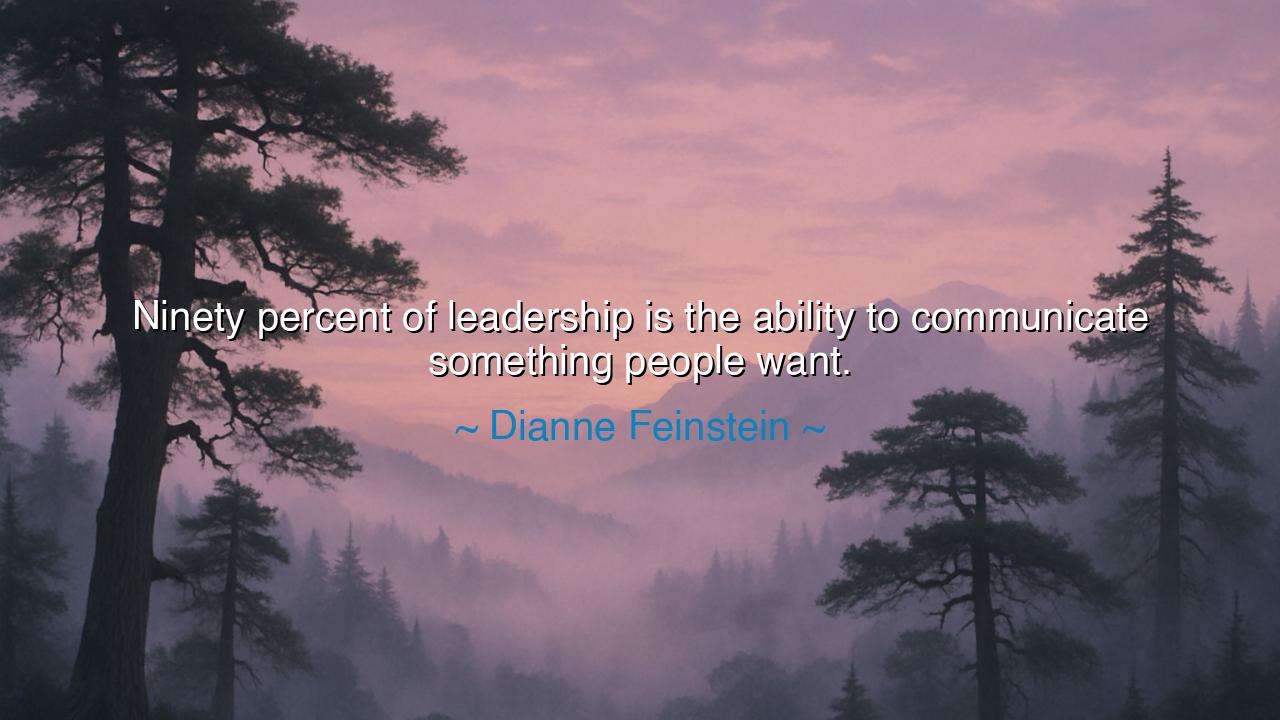
Ninety percent of leadership is the ability to communicate






Hear, O children of vision and heirs to the future, the words of Dianne Feinstein, a leader of steadfast will and seasoned wisdom: “Ninety percent of leadership is the ability to communicate something people want.” In this truth, simple yet profound, lies the heart of human influence — that power does not rest in command alone, but in connection. For the true leader is not a tyrant who speaks to be obeyed, but a guide who speaks to be understood. Words are the bridge between the vision of one and the hope of many. When spoken with clarity, courage, and sincerity, they kindle hearts into harmony and transform thought into motion.
Feinstein, who rose to prominence through both triumph and tragedy, knew well that leadership begins not with authority, but with voice. After the assassination of San Francisco’s mayor in 1978, she stood before a grieving city and found the strength to speak calm into chaos, to offer not rhetoric but reassurance. Her words carried no ornament, yet they steadied a people trembling in fear. Through that act, she embodied the very essence of her quote — that the greatest leaders are those who find words that meet the needs of their time, who give voice to the silent longing of the people they serve.
To communicate is not merely to speak, but to touch the spirit. The ancients knew this truth well. Consider Pericles of Athens, whose speeches stirred a city to greatness. He did not lead by decree alone; he led through the power of words that shaped belief. His people followed him not because he ruled them, but because he understood them — their hunger for glory, their fear of loss, their yearning for immortality through deeds. His eloquence was not manipulation, but revelation; he said aloud what lay hidden in their hearts. Thus, his leadership was not forced upon them — it was drawn forth from within them.
For the art of communication is the alchemy of the soul. The leader listens first, then speaks. He reads the hearts of his people as the sailor reads the stars, and by understanding their desires, he aligns them with purpose. Yet, beware: to speak what people want is not to flatter, but to awaken. The false leader tells men what they wish to hear; the true leader tells them what they have longed, in secret, to believe possible. His words do not seduce — they summon. They lift the weary and remind them that they were born for more than comfort.
Look also to Winston Churchill, who stood before the British people in their darkest hour and did not promise ease or safety, but “blood, toil, tears, and sweat.” And yet his people followed him, for he gave voice to the courage they already possessed. He communicated not mere optimism, but conviction — and that conviction became the armor of a nation. This is the mastery of the leader’s tongue: to turn shared desire into shared destiny, to take the scattered thoughts of a multitude and weave them into one clear call.
And so, O listeners, learn this: leadership is not a crown worn on the head, but a flame carried on the tongue. You may hold no title, yet still lead, if your words uplift others and guide them toward light. The mother who comforts her child, the teacher who inspires her students, the friend who steadies a lost soul — each is a leader in spirit. To communicate is to create connection, and in connection lies the seed of change.
To live this wisdom, you must first learn to listen — not with your ears alone, but with your heart. Ask what others truly need, not merely what they say they want. Speak with honesty, for false words are fleeting, but truth echoes through generations. Let your words heal, not harm; guide, not command. And when you speak, do so not to display your knowledge, but to awaken the wisdom in others.
So remember Feinstein’s teaching: the secret of leadership lies not in having all the answers, but in speaking the right truths at the right time. Words are arrows of light — use them to pierce the darkness of fear and doubt. Lead not through position, but through purpose; not through pride, but through empathy. For when your communication becomes an offering, when your voice carries what others most deeply want — hope, direction, and meaning — then you will not merely lead; you will inspire. And those who follow will not do so because they must, but because, through your words, they have remembered their own strength.






AAdministratorAdministrator
Welcome, honored guests. Please leave a comment, we will respond soon